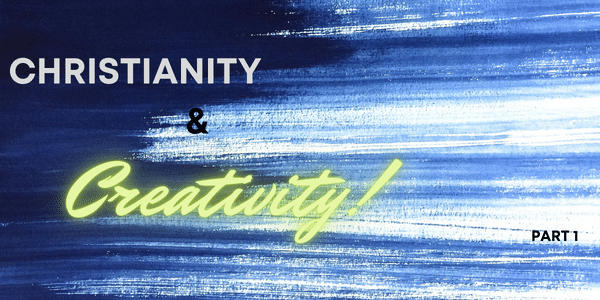
Chrisitianity and Creativity
by Jacob Hess
Part 1: Art and The Bible
As followers of Christ, we are called to worship God in every area of life, including the arts! Unfortunately, I think at times we fail to meditate on what it means to engage in creative works as Christians. So, I thought it would behoove us to do a short series on Christianity and creativity. Hopefully, these thoughts will be helpful to you as you think about taking up creative endeavors to the glory of God.
What the Bible Says About Art and Creativity
I believe the Bible has a lot to say about the nature of beauty and its place in our lives. This can be seen in the creation accounts of Genesis. In Genesis 1:27 it is declared, “So God created human beings in His own image, in the image of God He created them; male and female He created them.” Just a few verses later, God looks out over all His creation, confirming it is “very good” (Gen. 1:31). As made in God’s image we take our cues as to how to live and thrive in this world from Him, and the picture given in Genesis is of a loving God who delights in making good beautiful things with meaning and purpose.[1] Cosper, in his book The Stories We Tell, writes about our creative bent,
“All human creativity is an echo of God’s creativity. When God makes man, He forms him from the dirt, breathes life into him, and sends him out in the world (Genesis 2). We’ve been playing in the dirt ever since. Just as God took something He’d made, shaped it, breathed life and meaning into it, and transformed it into something new, so we set about our business, taking creation, shaping it, and giving it new meaning and purpose.”[2]
Implementing our Creativity
Every human activity can be seen in the light of the implementation of our creativity as we engage with this good and beautiful world God has made. This biblical foundation has implications for the artist proper. If “God is interested in beauty,”[3] and we are to glorify God in all that we do, than it would be well and good to assume that God desires our best efforts in all realms of work, including the arts. Just as Paul directed the slaves in his letter to the Ephesians to “Serve wholeheartedly, as if you were serving the Lord, not people,” (Eph. 6:7) so too should artists create with hearts and minds focused on the primary audience: the Father, Son, and Spirit. This is a lesson in humility, learning “to get oneself out of the way”[4] and let the art speak for itself,[5] but most of all it is to create “not to succeed in the world’s terms but in God’s terms,”[6] allowing one’s work to be “highways into the center of reality which cannot be glimpsed, let alone grasped, any other way.”[7]
Engaging our Community
This brings me to another point. Good art is about starting a conversation, about creating bridges of shared meaning. This was Paul’s goal as a missionary to the people around him. Paul sought to “to be all things to all people so that by all possible means I might save some” (1 Cor. 9:22b). In a similar way to Paul, our works of art can be avenues for creating bridges into the wider culture, but connecting with one’s audience means creating twenty first-century art, for “Art changes.”[8] We need to speak in ways that people outside of our comfort zones can hear us and respond. This means speaking honestly and not being afraid of facing the brokenness we see in the world around us. Schaeffer is right to advise artists to create in ways that are intelligible and not different where there is no need to be different.[9] Some Christian art fails in this way by being so afraid to offend that what is created simply does not ring true with the realities we face in a broken world. As Christian artists, we should speak with our art in ways that build bridges to those outside of our little enclaves. We should seek to start conversations that intrigue and invite people from all walks of life, every person who feels within them the innate longings that have birthed our work.
[1] Mike, Cosper. The Stories We Tell: How TV and Movies Long for and Echo the Truth. 33.
[2] Ibid.
[3] Ibid., 26.
[4] Bret, Lott. Letters & Life: On Being a Writer, on Being a Christian. 108.
[5] Ibid., 76.
[6] Ibid., 32.
[7] Wright, N. T. “New Creation, Starting Now.” Simply Christian: Why Christianity Makes Sense. 235.
[8] Francis A., Schaeffer. Art & the Bible: Two Essays. Revised ed. 75.
[9] Ibid.,
______________________________________
Jacob Hess is the Music and Media Minister of The Hallows Church, husband to Alexa and author of the book “The Bright Abyss.” (I, George San Miguel, added the link to his book. Everyone should check it out!)
